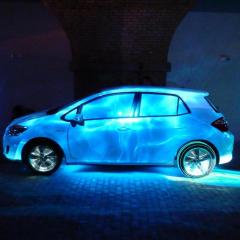Leaderboard
Popular Content
Showing content with the highest reputation on 06/06/2019 in all areas
-
Today had a pleasent result. For the last year or more car has not been as smooth as when first bought 18 short years ago. Poor start up/ warm up tick over and when warmed up normal tickover oscillating between 700rpm to shudder low revs to pickup again. Yesterday engine warning light on so had to bite the bullet and sort the fault. Long story short, the original vacuum link from MAP sensor to manifold (yes MAP sensor) looked fine till I disconnnected it and found extreme fatigue failure cracks and also slack fit to the device spiggot. New pipe ty wrapped on superb smooth running motor. I had couple of weeks before checked and cleaned most of the snap on electrical connectors just in case corrosion effects. Non present. Cost of fix absolutely nowt, the perfect price. I am now content to drive through heavy traffic again. Best of luck one happy Fixitphil2 points
-
Change yearly. Any 5W-30 or 0w-20 (fully or semi-synth) will be just fine. Just make sure its SL or SM or SN spec. The brand doesn't matter so long as it meets the spec.2 points
-
Modern oils are formulated to resist sludging but yes you should be changing the oil per the manufacturers recommendations using the recommended grade. Checking the oil is s different matter. Low oil level is still the most common cause of catastrophic engine failure. Put simply, by the time the oil pressure light is on, it's too late. If you have an oil level indicator these are a help but aren't infallible. If you have a dipstick, take a few minutes a week, if you've driven the car, or each month if you don't drive many miles, and check all the fluid levels, tyres, wipers etc. It's part of the training for any advanced driving qualification. Sent from my SM-G965F using Tapatalk2 points
-
So you check your oil every 2 years.???..... don't think that's good practice and is very risky.! I use nothing BUT fully synthetic in our Toyotas'....and I check oil levels regularly...it takes but seconds to do.2 points
-
Experiment complete. Came home, all eight bars green, and came up the drive in reverse. By the time I was at the top, only six bars green. Neutral and coasted back to the gate. Neutral doesn't charge the battery, so at the gate, I selected reverse again and drove hard back up. Four bars green, and then repeated, then two bars green. Next time up, the engine revved high and at the top, I still had two bars green. Repeated another four times, and each time the engine revved and it stayed at two bars green. After the next one, I was a bit bored so didn't do any more, but it seems that two bars green was the minimum. The car wasn't as eager on the latter runs than on the first few, but it still did well. There you have it. Probably no limit to how far you can reverse. Mick.2 points
-
That depends what you mean. I have the 1.8 and the electric power can operate at up to 70mph but there isn't much benefit from it. You might be misunderstanding what the electric power is all about. At low speed (less than 30mph) it can be the sole source of propulsion for a mile or two (enough to get you in or out of a town on your commute) but you have to be gentle with the accelerator(*). At higher speeds (less than 60mph) it can be the sole source of propulsion if the conditions are right (descending sections of road) but it won't climb hills and won't keep you going along flat terrain unless you let the speed drop off. And in any case at those speeds it'll run out of juice in half a minute or less. Above 60mph it will only help keep the car going on definite declines. It can't keep the car going on the flat at 70mph. At those kinds of speeds though the electric power is really only helping give the ICE a bit more flexibility about what RPM to run at. It will wake up occasionally at motorway speeds so is probably helping a bit but probably not making much real difference. The thing about the Toyota hybrid system is that it's not about running around everywhere on electric power. Their system can do that for a short while and at low speeds can go a surprising distance like that but it's not what it's about. What it's about is reclaiming energy that would otherwise be lost during deceleration then using that energy to help the ICE work more efficiently. But make no mistake - it's an ICE car that has some electrical assistance. It is not a 'dual power source vehicle'. As regards actual mpg - it's slightly better than I'd expect from a pure ICE vehicle but not hugely so. I've always been an efficient driver. My previous car was a Mk3 Honda Jazz CVT and I was averaging 49mpg in winter, 53 in summer, measured pump to pump. My Corolla started off in spring at ~53mpg and now appears to be managing ~58mpg. That's an improvement but nothing stellar. Now if you go by the dashboard you might be fooled into thinking it was exceptional since mine is currently saying 61mpg. But the dash display can be very inaccurate at times. What I don't know is how a less efficient driver (ie; a typical driver that uses their brakes to slow down, leaves braking until the last second and accelerates hard only to put the brakes on again) would benefit. It's possible that a typical driver might see more significant benefits from the hybrid system than I do. Then again such drivers could see significant benefits if they just learnt how to drive efficiently 🙂 (*)There is a switch that allows you to tell the car you want to stay on electric power for as long as possible. This will extend the range at lower speed. However it's generally considered a bad idea. All the power in the battery comes from burning fuel in one way or another and the process of recovering that energy, storing it then sending it back to the wheels has losses. It's therefore not efficient to force the car to run on electric power. It's best to use that power sparingly to help the ICE. The ECU is pretty good at choosing when to do that but the driver can help by anticipating hills and similar.1 point
-
Hello everyone, I'm Anna and I just got my first Toyota, a 2015 Corolla LE. So far I'm mostly happy with it, it drives smoothly and handles the crappy patched up (or not patched up) roads here in New Jersey quite well. My only complaint is that it is slow to accelerate after a stop, but I can live with that. I'm hoping to do some DIY work on the car, it has a couple of scratches, paint chips and so on. Also thinking about installing new speakers but I have no idea if that is easy enough for a DIY project. I'm planning on driving this car all the way to California, and on such a long trip you really need some oompf in your sound system! 😎1 point
-
This is just silly. Frosty kindly linked to some Petronas oil available on Amazon sold by EuroCarparts for £22.99 delivered. On EuroCarparts website its £60.99 with a discount today to make it £39.66. On their ebay shop its £22.99. Then Carparts4less is selling it for £18.69 on ebay. Now Carparts4less is a trading name of Euro Car Parts - it states that on their website. It makes no sense.1 point
-
Hi all Well I've bought another Toyota after not having one for over 10 years , the last one was a 1978 RX30 Cressida , this time is a 1999 Picnic 2.0 auto with less than 80k on it. Had the Cressida for about 20 years so we'll see if this lasts the same , so far it's looking good just a couple of things that need sorting for me. Cresad1 point
-
You may be sceptical, but switching to BP Ultimate, actually improved my Aygo's road handling and braking efficiency 🙄1 point
-
Hi, do you change your oil every 2 years or every year? If you don’t change every 12 months no matter how many miles you drive than you are risking to sludge your engine, get piston rings stuck and increased oil consumption. Fill in quality full synthetic oil and genuine filter or exactly same equivalent within manufacturer specs . You can also do an engine flush if the old oil is too dark and contaminated but this is up to you. Regards1 point
-
Auris might not have an oil light, but i guess if there was any warning, it would show up on the display. Petrol engines do consume oil, my current and previous car were both 1.6 and both consumed around 1l per 10k km, or a bit more if you do more highway driving. Considering you did 9k miles, the oil consumed in your case was normal, it should be below the dipstick, but not too much. I think the difference between low and full on 1.6 Auris are around 1.2 liters, so if we do the math, using average consumption of 1l per 10k km, you car used around 1.4, which would bring it below the dipstick. You can fill up the car with oil slowly, to see how much it used.1 point
-
I had an XJ6 that would use oil when filled with Semi but not full synthetic, Whether the same would be true for the Auris I don't know, but I've been using full in my Avensis for 8 years and over 100k miles and it's never used a drop as far as I know. The difference in price isn't great either. Sent from my SM-G965F using Tapatalk1 point
-
1 point
-
So, the computer recognised what was required, kicked in at 2 bars and put enough into the battery to keep you going. Computer programmers at Toyota must of been thinking of you, Mick, when they did the design.1 point
-
If from Yorkshire and It’s been a local car all it’s life come to my dealership since new what’s happened upon investigation is that the tow bar fitted the wiring was routed through the air vents in the rear panel instead of the grommet on the back panel so the air flap stayed open letting in water 🤷🏻♂️ I would keep it on but I won’t use it and the wiring had been ruined but also I think it looks much cleaner without it 🙂1 point
-
I would probably decide to cut or torch it off. A little oil in the cold side of the turbo is probably from the pcv system. Don't bother with a catch can for it. It provides a little lubrication for the intake valves. If you know it is definitely the compressor vanes or the turbine blades making the noise, then you are likely to get a fair amount of further use out of the turbo as it is. Maybe check there aren't any broken bits in the intake or exhaust. Exhaust bolts are very often annoying like you have been finding out.1 point
-
Hi there yes ive heard of loads of horror stories regarding the head gaskets on the 2.2d4d you said above you barely drive above 2000rpm that in itself is a possible facor or cause to why it went i was told with the 2.2d4d they suffer from excess carbon build up due to failure and wear of oil control rings on the pistons and burning of small amounts of oil the egr is also a massive problem with them as regards carbon if i had one personally i was told that you should give the 2.2d4d engine a good hard drive at least once a week and for a considerable distance too ie motorway at 80mph 5th gear 2900 to 3700rpm to burn excess carbon off but in general nobody should have to do that if the engine was decent from day one unfortunately those engines are more troublesome than theyre petrol vvti counterparts i have a 2.0 d4d myself and i was plagued with problems from day one first water pump then egr then set of glow plugs now turbo and it has 165000 mile i guarantee by 180k miles my DMF and head gasket will fail and ill be packing her in and going to my vvti avensis1 point
-
Thank you 'PaulinhoT', this is my 10th Toyota. The first was a Toyota 1000 back in the late 70's.1 point
-
Had a call today from Toyota and dealership, there is a bug with the nav system retaining the 3D setting. Dealer is currently downloading an update and will apply it to their demonstrator, if that fixes it they will then have me in to update mine. Contact your dealers about updating your systems!1 point
-
With a noise like that, it could also be the bearings on the way out, which wouldn't bode well for the remaining life of the turbo. I had a Citroen C5 and the turbo went, dumping lots of oil into the cooler, which increased the repair costs. I had sold it to a friend for scrap price as a project car for him. With that one, there was no indication that the turbo was dying. Do you want to go preventative maintenance which might be unnecessary, or drive it into the ground and risk possible extra damage/cost? Remember, the people telling you not to bother with a pre-emptive replacement are not the ones opening their wallet for this. Are you planning on changing it yourself or have someone else do it? If it is going to be a garage job I'd personally schedule it sooner, rather than after you get stranded on a motorway in a cloud of smoke. Maybe you will get lucky, driving it until it goes, or maybe you make your own luck.1 point
-
1 point







